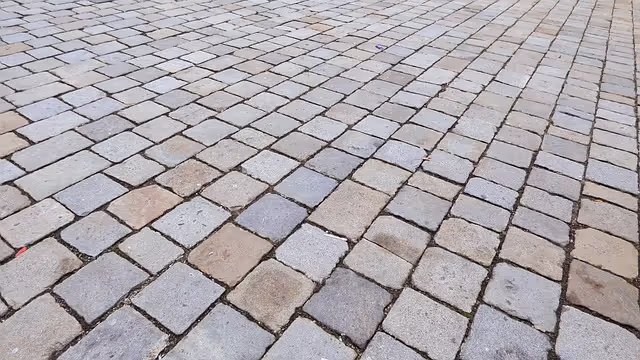What Causes Pavers to Sink? – What to Know

Over time, it’s not uncommon for your paved driveway, patio or walkway to develop some low spots or sunken pavers. When it comes to paver installations, low spots are an unfortunate reality. Fortunately, however, unlike asphalt or poured/stamped concrete, brick pavers are relatively easier to fix when there’s an issue. So, what causes pavers to sink?

What Causes Pavers to Sink?
In this article, we’ll discuss some of the reasons why your pavers may sink or have some low spots. Getting to know some of the reasons for sunken pavers helps you make an informed decision on the right course of action.
Shaky Ground
When it comes to low spots, the most likely culprit is an unstable ground beneath the patio. This is especially the case when you live in an area with harsh winters, where the freeze/thaw cycle has the potential to bend and warp the ground and the paver’s base material. This is often a very simple fix. Just remove the pavers in and around the sunken area then compact the sand before replacing the bricks in the same pattern. Although before doing this, you should calculate how much sand you’ll need for your pavers and learn how to properly lay pavers on dirt.
Water Exposure
Another common cause of sunken pavers is damage caused by water erosion. If there’s an area on or around your pavers where water collects, chances are the water can seep into the ground causing your paving stones to shift with the soil. This is more likely if the pavers see heavy traffic or if they carry heavy loads as you would expect with parking lots and driveways.
Also, if you have a faulty outdoor spigot that leaks small amounts of water over an extended time period, the pavers can end up sinking. Broken downspouts and gutters are a leading cause of water erosion-related damage caused by the prolonged exposure to large volumes of moving water. This type of situation can be tricky to fix as you need to start by fixing the source of the water erosion before moving on to paver repairs.
Poor Installation
Poor installation is also another major reason your pavers may end up sinking. This is often as a result of homeowners themselves or inexperienced contractors that might not know the proper paver driveway thickness or more. Poor installation is more likely to be an expensive and involving scenario that will sometimes require you to remove the existing patio, resettle the base and start over from scratch. To avoid such a scenario, be sure to hire only a competent installer for your paver installation.
The pavers can sink if the base of the paved area wasn’t properly prepared before laying the pavers. Paver stones need to be laid on a bed of coarse sand or compacted gravel. However, if the ground consists of a firm surface such as clay, you can easily get away with laying the pavers directly on the earth.
Bottom Line
What causes pavers to sink? The short answer is that pavers are likely to sink due to a poor installation, water exposure or a shaky ground. The best way to remedy such a situation and fix your sunken pavers is to investigate the reason for the shift before starting the fixing process. Worst comes to worst, you can always reach out to professionals for their expertise and knowledge.
